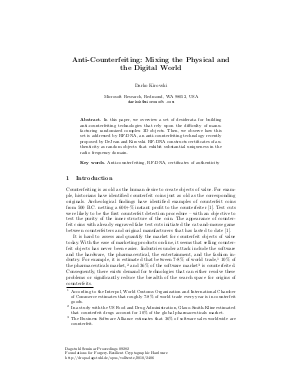Anti-Counterfeiting: Mixing the Physical and the Digital World
Author Darko Kirovski
-
Part of:
Volume:
Dagstuhl Seminar Proceedings, Volume 9282
Part of: Series: Dagstuhl Seminar Proceedings (DagSemProc) - License:
 Creative Commons Attribution 4.0 International license
Creative Commons Attribution 4.0 International license
- Publication Date: 2010-01-13
File

PDF
DagSemProc.09282.4.pdf
- Filesize: 314 kB
- 11 pages
Document Identifiers
Subject Classification
Keywords
- Certificates of authenticity
- RF-DNA
- physically unique one-way functions
Metrics
- Access Statistics
-
Total Accesses (updated on a weekly basis)
0PDF Downloads0Metadata Views
Abstract
In this paper, we overview a set of desiderata for building digital anti-counterfeiting technologies that rely upon the difficulty of manufacturing randomized complex 3D objects. Then, we observe how this set is addressed by RF-DNA, an anti-counterfeiting technology recently proposed by DeJean and Kirovski. RF-DNA constructs certificates of authenticity as random objects that exhibit substantial uniqueness in the electromagnetic domain.
Cite As Get BibTex
Darko Kirovski. Anti-Counterfeiting: Mixing the Physical and the Digital World. In Foundations for Forgery-Resilient Cryptographic Hardware. Dagstuhl Seminar Proceedings, Volume 9282, pp. 1-11, Schloss Dagstuhl – Leibniz-Zentrum für Informatik (2010)
https://doi.org/10.4230/DagSemProc.09282.4
BibTex
@InProceedings{kirovski:DagSemProc.09282.4,
author = {Kirovski, Darko},
title = {{Anti-Counterfeiting: Mixing the Physical and the Digital World}},
booktitle = {Foundations for Forgery-Resilient Cryptographic Hardware},
pages = {1--11},
series = {Dagstuhl Seminar Proceedings (DagSemProc)},
ISSN = {1862-4405},
year = {2010},
volume = {9282},
editor = {Jorge Guajardo and Bart Preneel and Ahmad-Reza Sadeghi and Pim Tuyls},
publisher = {Schloss Dagstuhl -- Leibniz-Zentrum f{\"u}r Informatik},
address = {Dagstuhl, Germany},
URL = {https://drops.dagstuhl.de/entities/document/10.4230/DagSemProc.09282.4},
URN = {urn:nbn:de:0030-drops-24063},
doi = {10.4230/DagSemProc.09282.4},
annote = {Keywords: Certificates of authenticity, RF-DNA, physically unique one-way functions}
}
